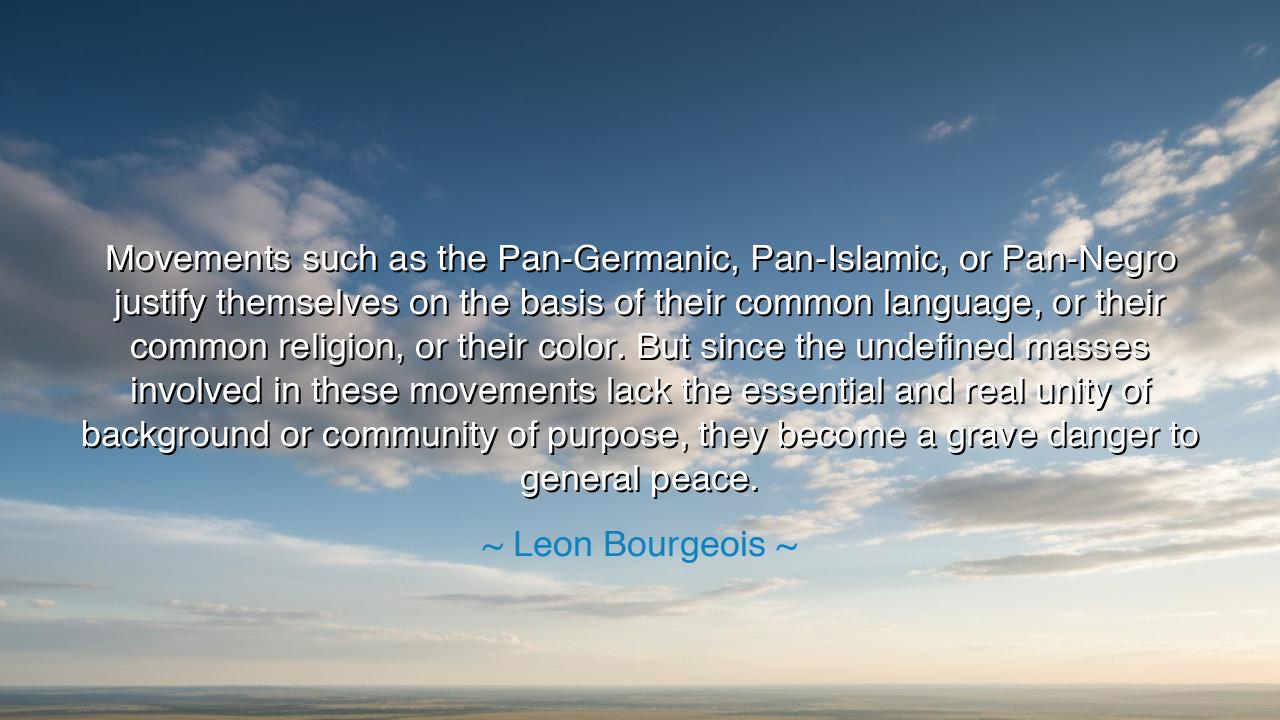
Movements such as the Pan-Germanic, Pan-Islamic, or Pan-Negro
Movements such as the Pan-Germanic, Pan-Islamic, or Pan-Negro justify themselves on the basis of their common language, or their common religion, or their color. But since the undefined masses involved in these movements lack the essential and real unity of background or community of purpose, they become a grave danger to general peace.






"Movements such as the Pan-Germanic, Pan-Islamic, or Pan-Negro justify themselves on the basis of their common language, or their common religion, or their color. But since the undefined masses involved in these movements lack the essential and real unity of background or community of purpose, they become a grave danger to general peace." These words from Leon Bourgeois speak to the complex and sometimes perilous nature of identity-based movements. In his statement, Bourgeois critiques movements that base their unity on superficial aspects such as language, religion, or race—elements that, while undeniably important, cannot, by themselves, create the deep and lasting solidarity needed for meaningful, peaceful change. Bourgeois suggests that without a shared purpose or common values, such movements can lead to conflict, rather than the peace they seek to foster.
In the ancient world, the power of shared identity—whether based on culture, language, or religion—was often used to unify peoples for both peaceful and violent ends. The Romans constructed their vast empire on the idea of a unified people, bound together by law, language, and loyalty to the Emperor. But even the Romans—in their glory and conquest—were not free from internal divisions and conflicts. The identity of the Roman Empire was continually challenged by the expansion of its borders and the introduction of new cultures and beliefs. While these movements sought unity, the lack of shared purpose often resulted in revolts, rebellions, and eventually, the fall of the empire. Bourgeois’ observation echoes the truth that identity movements built on narrow, superficial bonds often fail to build the cohesion required for true peace.
The French Revolution provides a relevant historical example of the dangers of movements fueled by a shared identity that lacks a deep and meaningful shared purpose. The revolutionaries, united under the banner of liberty, equality, and fraternity, initially sought to overthrow the monarchy and the aristocracy. Yet, despite their common ideals, internal divisions—particularly between the Jacobins and the Girondins—soon turned the movement against itself. What began as a movement for freedom and justice devolved into the Reign of Terror, where the very forces that once sought unity through shared values became instruments of violence. The French Revolution serves as a cautionary tale that even the most noble movements, when driven by a flawed sense of unity, can collapse into destruction and division.
Similarly, the Pan-African Movement, while founded on the shared desire for the liberation and unity of people of African descent, has often faced challenges in translating its initial calls for solidarity into tangible, lasting change. While the movement advocates for freedom, equality, and self-determination, the diversity of cultures, religions, and political systems within the African continent has sometimes made it difficult to achieve the unity needed for collective action. Without a clear, unified purpose beyond shared heritage, the risk arises that the movement can fragment, giving rise to division rather than the unified strength required to confront global injustice. This illustrates Bourgeois' point that shared race or religion alone cannot bind people in a meaningful way unless those identities are connected to a shared and unifying purpose.
Bourgeois’ critique of movements based solely on superficial unity can also be seen in the rise of nationalism in the 20th century. The Pan-Germanic movement, which sought the unification of all German-speaking peoples, eventually led to the dangerous ideology of Nazism, where race, rather than shared values of justice and peace, became the defining feature of the movement. The Third Reich, in its obsessive pursuit of racial purity, became one of the most destructive forces in world history, leading to the Holocaust and World War II. Bourgeois would likely have seen the German desire for unity based on language and ethnicity as a shallow foundation for such immense suffering and division. The lesson here is clear: while shared identity can be a starting point for unity, without a higher purpose that is inclusive and focused on the common good, such movements often spiral into violence and chaos.
The lesson in Bourgeois’ words is that true unity cannot be built solely upon shared characteristics such as race, religion, or language. These are important aspects of identity, but they are not sufficient on their own to sustain a peaceful and coherent society. Shared purpose, rooted in common values such as justice, compassion, and the desire for peaceful coexistence, is essential for any movement that seeks to create lasting change. Movements that emphasize division based on identity alone risk creating conflict, rather than solidarity.
In our own time, we must be cautious when forming or joining movements that claim to represent a unified identity. While it is important to celebrate and honor the diversity of our backgrounds and experiences, we must also ensure that our movements are not driven solely by differences, but by a shared commitment to a greater good. Unity should not be an end in itself but a means of fostering peace, justice, and equality for all. Let us work to build movements that are rooted in common purpose, where shared identity can serve as a foundation for a more inclusive, compassionate, and peaceful world. True unity comes from recognizing our shared humanity, not just our shared differences.






AAdministratorAdministrator
Welcome, honored guests. Please leave a comment, we will respond soon